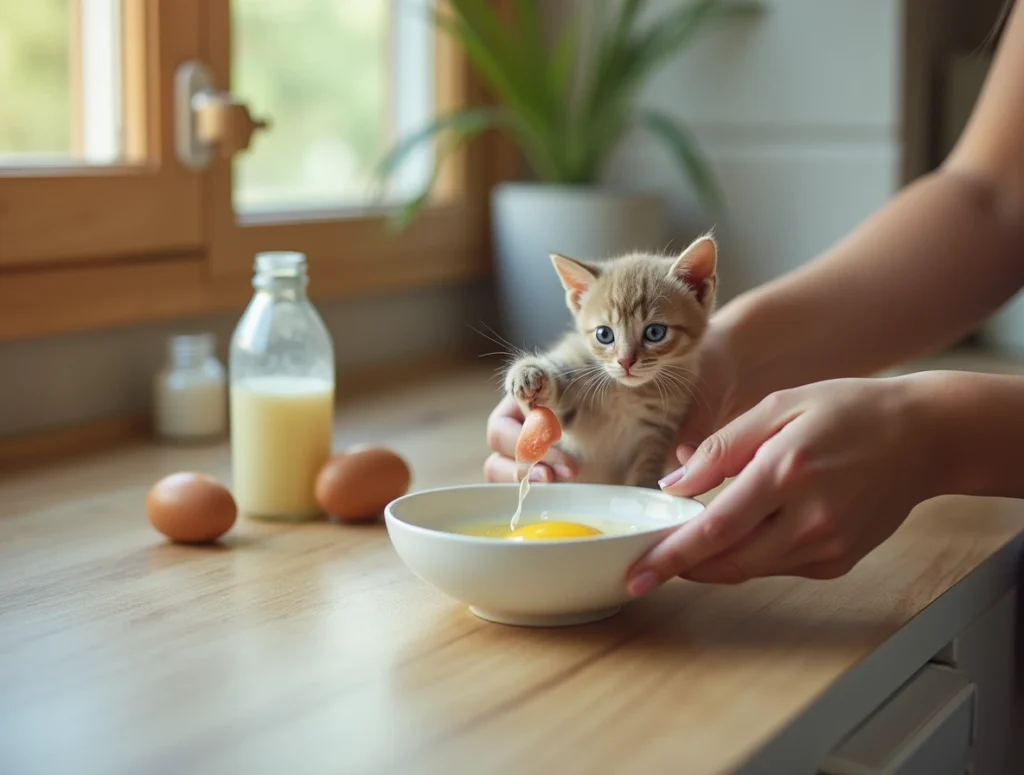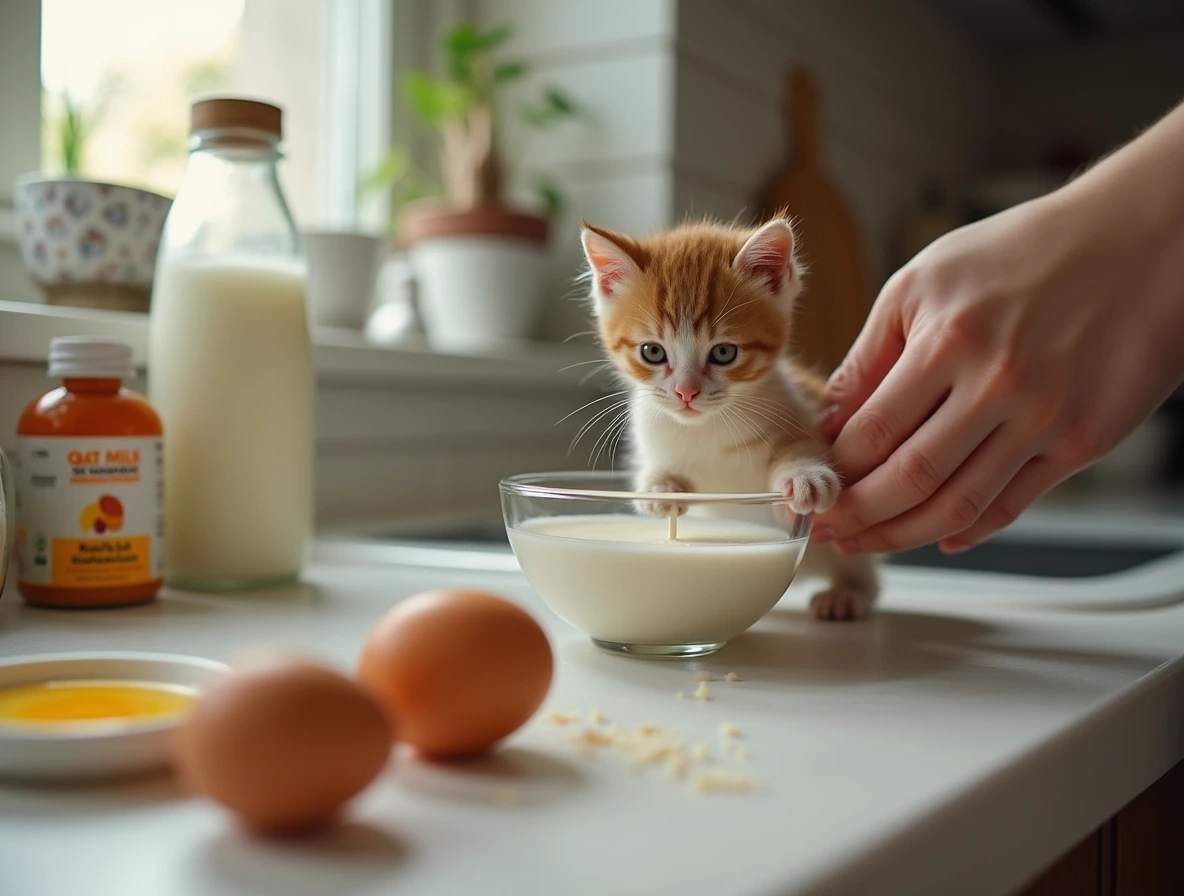Caring for a tiny, vulnerable kitten is both rewarding and challenging. If you’re fostering or suddenly find yourself responsible for an orphaned kitten, you know that feeding is one of your top concerns. Many kittens rely on their mother’s milk for essential nutrients, but when that’s not an option, knowing how to make a homemade kitten milk replacer can be crucial. While commercial kitten milk replacers are available, it’s not always possible to have them on hand. In these cases, a safe and nutritious homemade kitten milk replacer can be a lifesaver. This guide provides practical, vet-approved recipes that ensure your kitten gets the nutrients they need.
Table of Contents
Why Use a Homemade Kitten Milk Replacer?
Emergency Situations
IImagine you come across a newborn kitten that’s alone, hungry, and in need of immediate care. These situations often come with little notice, and a quick solution is necessary to keep the kitten hydrated and nourished until professional care is available. A homemade kitten milk replacer can serve as an excellent short-term solution when you don’t have access to commercial products, allowing you to bridge the gap until you can find a reliable supply.
Adding a homemade replacer also helps fill the gap when there’s no immediate access to commercial options. This quick fix can save a kitten’s life in situations where immediate nourishment is needed but isn’t available on store shelves. Preparing this temporary substitute can ease your worries until a stable, long-term solution is in place.
Benefits of Homemade Milk Replacers
Preparing a homemade kitten milk replacer has multiple benefits beyond just convenience:
- Cost-Effective: Homemade recipes can be more budget-friendly, especially when caring for multiple kittens.
- Customizable: Each batch can be tailored to your kitten’s needs, adjusting ingredients based on availability.
- Fresh Ingredients: By using quality ingredients, you ensure your kitten receives fresh, wholesome nutrition without preservatives.
Not only are these milk replacers cost-effective, but they also provide peace of mind since you control every ingredient that goes into the formula. Unlike commercial options that might contain additives, homemade options rely on natural ingredients, tailored to what kittens need.
Nutritional Needs of Newborn Kittens
Essential Nutrients for Growth
Kittens have specific dietary needs during their early development. A balanced formula should provide these essentials:
- Proteins: Essential for supporting growth and muscle development. Proteins also help with the formation of enzymes, which are crucial for digestion and overall health.
- Fats: Support energy and keep their fur shiny and healthy. Essential fatty acids, like those found in fish oils, are great for kittens as they help maintain skin elasticity and promote a glossy coat.
- Carbohydrates: While less critical, a small amount provides digestible energy. Though kittens don’t need large amounts, small doses can be beneficial for quick energy, especially during their active phases.
- Taurine: A crucial amino acid for cats that supports heart and eye health. Taurine cannot be synthesized by cats themselves, so it must come from their diet. It plays a vital role in preventing heart disease and ensuring visual acuity.
- Calcium and Phosphorus: Vital for developing strong bones and teeth. A balanced ratio of these minerals ensures healthy bone density and aids in proper nerve function.
Always consult a vet if you’re unsure whether a homemade formula meets your kitten’s needs, as nutritional imbalances can have long-term effects. For kittens, even minor deficiencies can impact their health, making it crucial to prioritize complete nutrition.
What to Avoid
Some common household ingredients are unsuitable or even harmful for kittens. Here’s what to avoid:
- Cow’s Milk: Often leads to digestive upset due to high lactose content. Kittens typically have difficulty digesting lactose, which can result in diarrhea and dehydration.
- Plant-Based Milks: Almond, soy, and oat milk lack essential nutrients and may cause stomach upset. Plant-based options often don’t provide the necessary proteins and fats for feline health.
- Dairy Products with Added Sugars or Flavors: These can disrupt digestion and may contain ingredients toxic to kittens. Sugar, in particular, can strain their immature digestive systems.
When in doubt, opt for simple ingredients with known benefits to avoid any digestive or health issues. It’s always better to stick to the essentials, focusing on whole foods and carefully selected ingredients.
Safe and Easy Homemade Kitten Milk Replacer Recipes
These recipes offer safe, easy-to-make alternatives to commercial kitten milk replacers. Each homemade kitten milk replacer recipe uses widely available ingredients and provides balanced nutrition for short-term feeding.

1. Basic Kitten Milk Replacer
This recipe is perfect for emergencies when you have limited ingredients.
| Ingredients | Measurements |
| Goat milk | 1 cup |
| Cooked egg yolk | 1 |
| Plain yogurt (no sugar) | 1 tbsp |
| Light corn syrup | 1 tsp |
Instructions:
- In a mixing bowl, combine the goat milk, cooked egg yolk, yogurt, and corn syrup.
- Blend thoroughly to ensure the ingredients are well mixed.
- Warm the mixture to room temperature before feeding your kitten.
- Store any leftovers in the refrigerator and use them within 24 hours.
This simple formula delivers balanced protein and fat for growth, while yogurt aids in digestion. Goat milk is gentler on a kitten’s stomach than cow’s milk, while egg yolk adds essential fats and nutrients.
2. Protein-Rich Kitten Formula
Designed to support growth and development, especially useful for active, growing kittens.
| Ingredients | Measurements |
| Goat milk | 3/4 cup |
| Egg yolk | 1 |
| Vegetable oil | 1/2 tsp |
| Liquid infant vitamins (vet-approved) | 1-2 drops |
Instructions:
- In a small bowl, mix the goat milk, egg yolk, and vegetable oil thoroughly until the mixture is smooth.
- Add a few drops of infant vitamins to provide essential nutrients.
- Warm to body temperature before feeding.
- Refrigerate and discard after 24 hours.
Egg yolk and vegetable oil provide healthy fats, while infant vitamins add a boost of essential minerals and vitamins for overall health. These added vitamins help compensate for nutrients that homemade recipes might lack, bridging the gap between homemade and commercial formulas.
3. Electrolyte-Enhanced Formula
Perfect for kittens needing hydration support, especially if they’ve shown signs of weakness or dehydration.
| Ingredients | Measurements |
| Goat milk | 1/2 cup |
| Egg yolk | 1 |
| Corn syrup | 1 tsp |
| Electrolyte solution (unflavored, vet-approved) | 1-2 tsp |
Instructions:
- Mix goat milk, egg yolk, and corn syrup in a bowl until well combined.
- Add a small amount of electrolyte solution, stirring until smooth.
- Warm the mixture before feeding, making sure it’s not too hot.
- Store in the refrigerator and discard after 24 hours.
Electrolytes help keep kittens hydrated, especially if they’ve recently had digestive issues or low energy. Including an electrolyte solution can be especially helpful during hot weather or if the kitten appears sluggish.
Feeding Guide for Newborn Kittens
How Much to Feed by Age
Feeding amounts depend on a kitten’s age and size. The table below offers general guidelines, but always consult your veterinarian for personalized advice.
| Kitten Age | Amount per Feeding | Feedings per Day |
| 0-1 week | 3-4 ml | 6-8 |
| 1-2 weeks | 5-7 ml | 6-7 |
| 2-3 weeks | 7-10 ml | 5-6 |
| 3-4 weeks | 10-13 ml | 4-5 |
As kittens grow, their nutritional needs change. Being mindful of their age-appropriate feeding can help avoid overfeeding or underfeeding.
Feeding Tips and Techniques
- Use the Right Equipment: A small nursing bottle or syringe works best for feeding. Make sure it’s clean and sterilized.
- Warming the Formula: Kittens prefer their milk replacer close to body temperature. Always check the temperature on your wrist before feeding to ensure it’s safe.
- Burp Your Kitten: Like human babies, kittens benefit from being burped after feeding to prevent digestive discomfort. Gently hold your kitten upright and softly pat their back.
- Monitor Weight: Keeping track of your kitten’s weight can provide insight into their health. Regular weight gain is a positive sign.
Weight monitoring ensures that your kitten is thriving on the homemade formula and can help you make any necessary dietary adjustments.
Conclusion
Providing the right nutrition for a newborn kitten is essential to their development and health. These homemade kitten milk replacer recipes offer temporary solutions when you need a quick, nutritious substitute in an emergency. By using a homemade kitten milk replacer, you’re not only feeding your kitten but also providing them with the strength and energy to thrive. As always, consult with a vet to ensure your kitten’s diet remains balanced, especially if homemade milk replacers will be used for more than a few days.
Next time you find yourself caring for a tiny feline, you’ll have the knowledge and recipes to give them the best start possible. This initial nutrition is key to their well-being and lays the foundation for a happy, healthy life.
FAQs
Can I use cow’s milk as a kitten milk replacer?
No, cow’s milk lacks essential nutrients and can lead to digestive problems in kittens.
How often should I feed a newborn kitten?
Newborn kittens generally need to be fed every 2-3 hours, even through the night, until they grow older.
How long can I use a homemade kitten milk replacer?
Homemade kitten milk replacers are ideal for short-term use. For long-term feeding, a commercial formula is recommended for balanced nutrition.
What should I do if my kitten isn’t drinking the homemade formula?
Try warming the formula to make it more appealing. If the kitten continues to refuse, consult a veterinarian.
Useful Resources for Kitten Care and Nutrition
ASPCA (American Society for the Prevention of Cruelty to Animals)
- Kitten Care Guide : https://www.aspca.org/pet-care/cat-care/general-cat-care
Cornell University College of Veterinary Medicine
- Feeding Growing Kittens : https://www.vet.cornell.edu/departments-centers-and-institutes/cornell-feline-health-center
The International Cat Care
- Feeding and Nutrition for Cats : https://icatcare.org/advice/feeding-your-cat/
PetMD
- Kitten Nutrition Basics : https://www.petmd.com/cat/nutrition/evr_ct_kitten_nutrition_basics
The Kitten Lady
- Bottle Feeding Kittens : https://www.kittenlady.org/bottlefeeding

